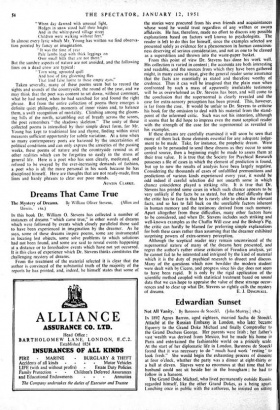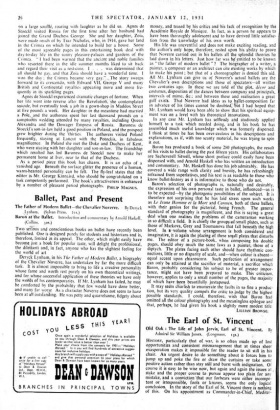Edwardian Sunset
Not All Vanity. By Baroness de Stocckl. (John Murray.. IRS.) IN 1892 Agnes Barron, aged eighteen, married Sacha de Stoeckl. Attachd at the Russian Embassy in London, who later became Equerry to the Grand Duke Michael and finally Comptroller to the Grand Duchess George. Her parents were Irish ; her father's vast wealth was derived from Mexico, but he made his home in Paris and entertained the fashionable world on a princely scale. At the start of her diplomatic life in London, Baroness de Stoeckl found that it was necessary to do '' much hard work ' resting ' to look fresh." She would begin the exhausting process of dressing at four o'clock, whether the party was a dinner at eight-thirty or a ball at eleven. Sleeves were so enoimous at that time that her husband could not sit beside her in the brougham ; he had to follow in a hansom.
The Grand Duke Michael, who lived permanently outside Russia. regarded himself, like the other Grand Dukes, as a being apart. Lunching once in public with the authoress, he insisted on sitting on a large soufflé, roaring with laughter as he did so. Agnes de Stoeckl visited Russia for the first time after her husband had joined the Grand Duchess George She and her daughter, Zola, were made much of by Tzar Nicholas, who, in 1914, gave her land in the Crimea on which he intended to build her a house. Some of the most agreeable pages in this entertaining book deal with day-to-day life in the sunny pleasure-palaces and gardens of the Crimea. " I had been warned that the ancient and noble families who resorted there in the idle summer months liked to sit back and regard their visit as a rest-cure. 1 . . . was determined that all should be gay, and that Zoia should have a wonderful time. I won the day ; the Crimea became very gay." The story sweeps forward to its crescenJo, with Edward VII, George V and many British and Continental royalties appearing more and more fre- quently in its sparkling pages. Agnes de Stoeckl experienced dramatic changes of fortune. When her life went into reverse after the Revolution.' she contemplated suicide, but eventually took a job in a gown-shop in Maddox Street at live pound, a week. Her daughter in the meantime had married a Pole, and the authoress spent her last thousand pounds on a sumptuOus wedding attended by many royalties, including Queen Alexandra and the Dowager Empress of Russia. Baroness de Stoeckl's son-in-law held a good position in Poland, and the prospect grew brighter during the 'thirties. The authoress visited Poland frequently, staying at Lancut with the Potockis, in fabulous magnificence. In Poland she met the Duke and Duchess of Kent, who were staying with her daughter and son-in-law. The friendship which resulted has led Baroness de Stoeckl now to make her permanent home at Iver, near to that of the Duchess.
As a period piece this book has charm. It is an echo of a vanished age. Beneath the surface glitter the presence of a human, warm-hearted personality can be felt. The fly-leaf states that the editor is Mr. George Kinnaird. who should be congratulated on a task competently performed. The book's attractiveness is enhanced by a number of pleasant period photographs. PHILIP MAGNUS.



































 Previous page
Previous page